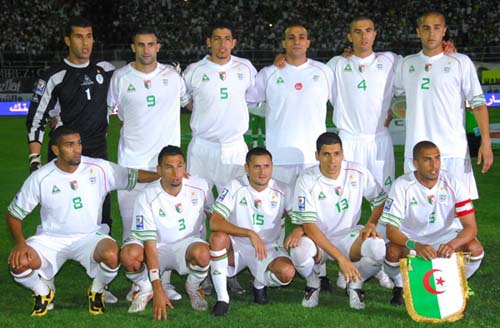“How Football Changed in Algeria
Related Articles How Football Changed in Algeria
How Football Changed in Algeria

Football in Algeria is more than just a game; it is a symbol of national identity, unity, and pride. From its humble beginnings during the colonial era to its current status as a professional sport, football in Algeria has undergone a remarkable transformation, reflecting the country’s social, political, and economic changes.
Early Years: A Tool of Resistance
Football was introduced to Algeria during the French colonial period in the late 19th century. Initially, it was a sport primarily played by European settlers, but it soon gained popularity among the Algerian population. For Algerians, football became a means of expressing their national identity and resisting colonial rule.
The first Algerian football clubs were established in the early 20th century, often with the support of nationalist movements. These clubs provided a platform for Algerians to come together, celebrate their culture, and assert their identity in the face of colonial oppression. Football matches became a focal point for nationalist sentiment, with fans using them as an opportunity to express their support for independence.
During the Algerian War of Independence (1954-1962), football played an even more significant role in the struggle for freedom. In 1958, a group of Algerian football players, many of whom were stars in French clubs, defected to join the National Liberation Front (FLN), the main organization fighting for Algerian independence. They formed the FLN football team, which traveled the world to raise awareness about the Algerian cause and garner support for the independence movement.
The FLN football team became a symbol of Algerian resistance and a source of inspiration for Algerians both at home and abroad. Their matches were not just sporting events; they were political statements that challenged French colonial rule and asserted Algeria’s right to self-determination.
Post-Independence: Building a National Identity
After Algeria gained independence in 1962, football became a key tool for nation-building. The newly independent government recognized the power of football to unite the country and promote a sense of national identity. Efforts were made to develop the sport at all levels, from grassroots programs to professional leagues.
The Algerian Football Federation (FAF) was established in 1962, and the country joined FIFA in 1964. The first Algerian professional league, the Championnat National, was established in 1964, providing a platform for local talent to develop and compete.
In the 1970s and 1980s, Algerian football experienced a golden era. The national team, known as "Les Fennecs" (The Desert Foxes), achieved significant success on the international stage. In 1982, Algeria qualified for the FIFA World Cup for the first time, and they shocked the world by defeating West Germany 2-1 in their opening match. Although they did not advance beyond the group stage, their performance was a source of immense pride for Algerians and a testament to the progress of Algerian football.
Challenges and Setbacks
Despite the successes of the 1970s and 1980s, Algerian football faced numerous challenges in the following decades. Political instability, economic difficulties, and corruption all had a negative impact on the development of the sport.
The Algerian Civil War in the 1990s was a particularly difficult period for Algerian football. The conflict disrupted the league, forced many players to leave the country, and created a climate of fear and uncertainty.
In addition to these challenges, Algerian football also suffered from a lack of investment in infrastructure, training, and youth development. Many clubs struggled financially, and the quality of play in the league declined.
Revival and Professionalization

In the early 2000s, efforts were made to revive Algerian football and address the challenges it faced. The government implemented reforms to improve the governance of the sport, combat corruption, and attract investment.
One of the key initiatives was the professionalization of the Championnat National in 2010. This involved implementing stricter financial regulations, improving infrastructure, and raising the standards of coaching and player development.
The professionalization of the league has had a positive impact on Algerian football. Clubs are now better managed, players are better paid, and the quality of play has improved. The league has also become more attractive to sponsors and investors, which has helped to generate more revenue.
Recent Successes and Future Prospects
In recent years, Algerian football has experienced a resurgence, both on and off the field. The national team has achieved significant success, and the league is becoming more competitive.
In 2019, Algeria won the Africa Cup of Nations for the second time in their history, defeating Senegal in the final. This victory was a source of immense joy for Algerians and a testament to the progress of Algerian football.
The success of the national team has helped to raise the profile of Algerian football and attract more attention from international scouts and agents. Many Algerian players are now playing in top leagues around the world, and they are serving as ambassadors for their country.
Looking ahead, the future of Algerian football looks bright. The country has a young and talented population, a growing economy, and a passionate fan base. With continued investment and development, Algerian football has the potential to become a major force in Africa and beyond.
The Social Impact of Football in Algeria
Football in Algeria has a profound social impact, influencing various aspects of Algerian life, including:
- National Identity and Unity: Football serves as a powerful unifying force, bringing together Algerians from diverse backgrounds and regions. The national team’s successes are celebrated by all Algerians, fostering a sense of collective identity and pride.
- Social Cohesion: Football clubs often serve as community hubs, providing a space for people to socialize, build relationships, and engage in positive activities. Football matches can also bring communities together, fostering a sense of camaraderie and shared experience.
- Youth Development: Football provides opportunities for young Algerians to develop their skills, build their confidence, and pursue their dreams. Football academies and grassroots programs help to identify and nurture talented players, providing them with a pathway to professional football.
- Economic Opportunities: The professionalization of Algerian football has created new economic opportunities for players, coaches, and other professionals involved in the sport. Football clubs also contribute to the local economy through job creation, tourism, and investment.
- Social Commentary: Football can also serve as a platform for social commentary and political expression. Fans often use football matches to voice their opinions on social and political issues, and players can use their platform to raise awareness about important causes.
Challenges and Opportunities
Despite its positive impact, football in Algeria also faces several challenges, including:
- Corruption: Corruption remains a problem in Algerian football, affecting the governance of the sport, the transfer of players, and the allocation of resources. Combating corruption is essential to ensure the integrity of the sport and promote fair play.
- Violence: Violence is a recurring problem in Algerian football, both on and off the field. Efforts are needed to address the root causes of violence, promote sportsmanship, and ensure the safety of players and fans.
- Infrastructure: The lack of adequate infrastructure is a major obstacle to the development of Algerian football. Many clubs lack modern stadiums, training facilities, and equipment. Investing in infrastructure is essential to improve the quality of play and attract more fans.
- Youth Development: While progress has been made in youth development, more needs to be done to identify and nurture talented players. Investing in football academies, grassroots programs, and coach education is essential to ensure the long-term success of Algerian football.
- Financial Sustainability: Many Algerian football clubs struggle financially, making it difficult for them to compete with clubs from other countries. Finding ways to improve the financial sustainability of Algerian clubs is essential to ensure their long-term viability.
Despite these challenges, Algerian football has enormous potential. With continued investment, development, and good governance, Algerian football can become a major force in Africa and beyond.
Conclusion
Football in Algeria has come a long way since its early days as a tool of resistance during the colonial era. It has evolved into a professional sport that plays a vital role in Algerian society. Football in Algeria is a source of national pride, a unifying force, and a platform for social commentary. Despite the challenges it faces, Algerian football has a bright future, and it has the potential to continue to inspire and unite Algerians for generations to come.

